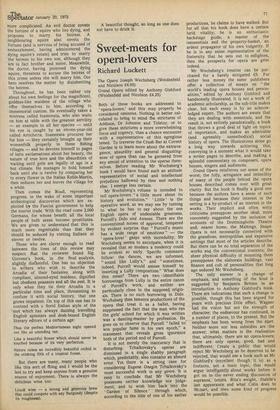Sweet-meats for opera-lovers
Richard Luckett
The Opera Joseph Wechsberg (Weidenfeld and Nicolson £4.95) Grand Opera edited by Anthony Gishford (Weidenfeld and Nicolson e4.25) Both of these books are addressed to 'opera-lovers,' and this may properly be considered ominous. Nothing is better calculated to bring to mind t'he strictures of Addison, Dr Johnson and Tolstoy, or to give these strictures a more overwhelming force and cogency, than a chance encounter with a representative of this egregious breed. To traverse the Crush Bar at Covent Garden is to learn more about the extrava gance, absurdity and general disgustingness of opera than can be garnered from any amout of attention to the operas them selves. Before reading Mr Wechsberg's book I would have found such an attitude representative of social and intellectual prejudices hallowed by time and nothing else. I emerge less certain.
Mr Wechsberg's volume is intended to tell opera-lovers "a little more about its history and evolution." ' Little ' is the operative word, as we may see by turning to what he has to say about the one English opera of undeniable greatness, Purcell's Dido and Aeneas. There are the conventional noises of approval, tempered by evident surprise that " Purcell's music has a wide range of emotions" — the 'opera-lover' gasps with incredulity, Mr Wechsberg seems to anticipate, when it is revealed that so modern a tendency could be evident so early. Specific comments follow: the dances, we are informed, "sound like Lully's," and "sometimes, indeed, Purcell would amuse himself by Inserting a Lully composition." What does this mean? There are two identifiable borrowings from Lully in the entire canon of Purcell's work, and neither are particularly close to the supposed originals. There is no such borrowing in Dido.
Wec'hsberg then laments productions of the opera that treat it as a ballet, having suppressed the fact that the man who ran the girls' school for which it was written was a dancing-master by profession. He goes on to observe that Purcell "failed to win popular fame in his own epoch," a statement that reveals gross ignorance both of the period and of Purcell.
It is not merely the inaccuracy that is disturbing. Tchaikovsky's operas are dismissed in a single shabby paragraph which, predictably, also contains an absurd error. Yet there is a strong case for considering Eugene Onegin Tchaikovsky's most successful work in any genre. It is easy to conclude that Mr Wechsberg possesses neither knowledge nor judgement, and to wish him back into the 'Garden of Silence' through which, according to the title of one of his earlier productions, he claims to have walked. But for all that his book does have a certain lurid vitality; he is an enthusiastic backstage guide, a master of the inessentials and the property-basket, an ardent propagator of his own Vulgarity. If he is in any sense representative of the fraternity that he sets out to enlighten, then the prospects for opera are grim indeed.
Mr Wechsberg's treatise can be purchased for a barely mitigated £5. For rather less money the same publishers offer a collection of essays on "the world's leading opera houses and person alities," edited by Anthony Gishford and handsomely illustrated. It is not a work of academic scholarship, as the sub-title makes clear, but each essay is by an acknowledged expert. The authors are aware that they are dealing with essentials, and the result is, not entirely paradoxically, a book that throws a good deal of light on topics of importance, and makes an admirable (and agreeably unmethodical) social history of opera. The illustrations alone go a long way towards achieving this, conveying in a moment what it would take a writer pages to describe, and making a splendid commentary on composers, opera houses, singers and audiences.
Grand Opera reinforces our sense of the worst; the folly, arrogance and imbecility of many of the people behind the opera houses described comes over with great clarity. But the book is finally a good one because the authors have a sense of such things and because their interest in the setting is a by-product of an interest in the works. Their implicit and often witty criticisms presuppose another ideal, more concretely suggested by the inclusion of accounts of the Drottningholm Theatre and, nearer home, the Maltings, Snape. Opera is not necessarily connected with the grandiose, metropolitan and expensive settings that most of the articles describe. But there can be no total separation of the works and the conventional contexts; the sheer physical difficulty of mounting them presupposes the elaborate buildings, vast finance and cult of personalities that long ago seduced Mr Wechsberg.
The only answer is a change of emphasis, and something of the kind is suggested by Benjamin Britten in an introduction to Anthony Gishford's book. There are indications that such a change is possible, though this has been argued for years with precious little effect. Wagner had the vision but not the strength of character; the endeavour has continued, in a number of places, to the present. But the emphasis has been wrong from the start. Neither more nor less subsidies are the answer; what matters is the realisation that, ultimately, there are no opera-lovers; there are only operas, good, bad and indifferent. Create a public that would reject Mr Wechsberg as he deserves to be rejected, that would see a book such as Mr Gishford's (excellent though it is) as a footnote, not a main topic, that would argue intelligently about works before it got on to the never ending discussion of sopranos, tenors, Rita's weight, Stabile's last appearance and what Colin does to Mozart, and then some kind of progress would be possible.


































 Previous page
Previous page